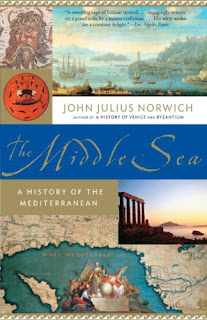Most historical surveys focus on specific countries, continents, or time periods; in The Middle Sea, however, author John Julius Norwich summarizes the history of nations lying along a body of water: the Mediterranean. This is largely a political/military history, with summaries of the myriad rulers and conflicts the region has seen over the past six (or so) millenia. After brief treatments of ancient Egypt, Greece, and Rome, the bulk of the work focuses on the Crusades (and Knights of St. John), Papal States, Republic of Venice (and her territories), Ottoman Empire, Spain, Napoleonic France, the Barbary Coast, a smattering of islands (to include Sicily, Crete, Cyprus, and Malta), and the unification/independence of modern Greece and Italy. The author chooses to conclude immediately after WWI. For each topic covered, only portions close to the Mediterranean are considered- thus, for example, the WWI portion covered only conflicts in Gallipoli, Salonika, and Palestine.
Why choose this specific body of water as the focus? Because of its importance:
Some six or seven thousand years ago the Mediterranean gave birth to Western civilisation as we know it. Its relatively small size, its confined shape, the gentleness of its climate, the blessed fertility and the manifold indentations of its European and Asiatic shores, all combined to provide a uniquely protective environment in which its various peoples could develop and flourish.Overall, this is a solid read. Norwich does a good job with a straightforward and concise delivery. He includes amusing anecdotes, making it easier to digest the wave of information. Focusing on a body of water was an interesting twist, and the variety of nations discussed help me make some historical connections I had previously missed. It's not perfect- some sections feel like he left out key backstory that left me hopelessly swimming in names and dates I didn't understand or put in context . . . but on the whole, this is a good summary.
You learn things about yourself when reading a work of such scope. I learned, for example, that (for whatever reason) I simply don't care much about Spanish or Italian history. I don't know why . . . but I started skipping or skimming those sections (again, due to my lack of interest, not lack of quality). Thus, I read most of this- probably 80% of the 600 pages- but not all. The work as a whole, however, is of value. It's a good summary for those planning vacations to the region.
Rating: A-


No comments:
Post a Comment